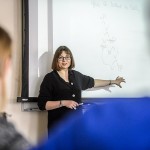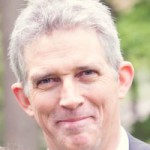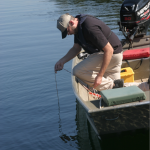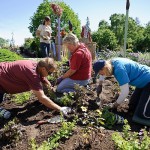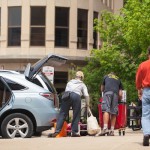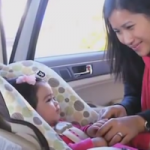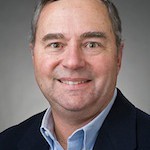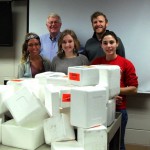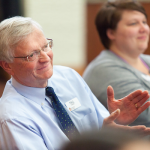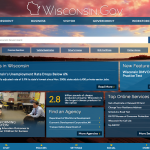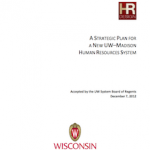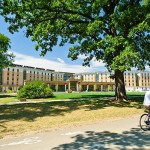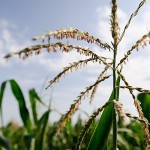Ten to receive Distinguished Teaching Awards
Ten faculty members have been chosen to receive this year’s Distinguished Teaching Awards, an honor given out since 1953 to recognize the university’s finest educators.
Citizen scientists provide clarity for lake researchers’ big questions
A massive new study of water clarity trends in Midwestern lakes is sure to make some waves in scientific circles. The study involved nearly a quarter of a million observations in 3,251 lakes spread across eight states, and data dating back seven decades. But it’s where that data came from that’s truly noteworthy. For the report, published online April 30 in the journal PLOS ONE, researchers turned exclusively to citizen scientists.
Public invited to UW Family Gardening Day on May 10
After a frigid winter and chilly spring, area gardeners are invited to celebrate the arrival of the gardening season - and gather a cornucopia of helpful ideas - at the UW Family Gardening Day on Saturday, May 10, on the University of Wisconsin–Madison campus.
Jail Library Group works to bring reading to inmates
Anna Wigtil is a member of a group that spends a few hours every weekend in jail.
Volunteer during move-out at university residence halls
As more than 7,400 students prepare to move out of the University Residence Halls, the UW–Madison Division of University Housing is asking for volunteers to help residents and their families repurpose or recycle items they no longer need
De-extinction: Will dead species live again?
De-extinction is a recent term that involves bringing back an extinct species using DNA that’s been recovered from preserved material. There are two ways that it can be accomplished: one would be cloning to produce a copy of an extinct individual’s genome. The second way is through genetic engineering to re-create a close approximation of what the extinct species’ genome might have once been. The reality is that it’s no longer science fiction. We’re getting close to being able to revive extinct species from recovered DNA.
Keep baby safe: Recycle car seats on May 3
While it’s tempting to save money by passing down used car seats, Safe Kids Madison says it’s not recommended.
Campus bike thefts on the rise
As the weather gets nicer, more and more people are out and about on their bikes. With that, we know the number of thefts of bicycles typically increases — and this year is no different. In fact, compared to this time last year, bike thefts on the UW–Madison campus have nearly doubled.
National Academy of Sciences adds three UW–Madison researchers
Three University of Wisconsin–Madison faculty members have been elected to the National Academy of Sciences, the organization announced today.
UW–Madison Styrofoam reuse and recycling program wins competition
A team of University of Wisconsin–Madison undergraduates has won a $90,000 award to expand a novel Styrofoam reuse and recycling program in the Madison area.
Paul Evans led University Housing through renewal and growth
Sometimes we choose our career, and sometimes a career chooses us. That may be the case with UW–Madison Housing Director Paul Evans, who first went to college with the idea of becoming a dentist, but next month leaves the university after 36 years, his entire career spent in housing.
State redesigns Wisconsin.gov website
I’m pleased to announce the launch of a redesigned www.Wisconsin.gov website to better serve the citizens of Wisconsin.
HR Design moves ahead on several fronts
Last week's legislative approval of a new UW–Madison personnel management system gives the green light for implementation of most of the HR Design strategic plan on July 1, 2015, but work has been continuing on other components of the plan as well.
University Housing director finalists chosen
The next leader of the University of Wisconsin–Madison's Division of Housing will be chosen from among finalists visiting campus during the next few weeks.
Mailick to join Graduate School
Marsha Mailick, a longtime University of Wisconsin–Madison faculty member and veteran of research leadership roles at the university, has been selected by Chancellor Rebecca Blank as interim successor to Martin Cadwallader, who is returning to the faculty.
Winning teams address global food system challenges, from food spoilage to hunger
The national Agricultural Innovation Prize: Powered by 40 Chances announced winning student teams during a two-day competition held at the University of Wisconsin–Madison on April 25-26, where students, competition judges, experts from a range of backgrounds and the public explored finalists' projects and larger ideas in business, science and society.
The world of networked objects explored
All of us are used to our Internet tethers. Increasingly, however, the inanimate objects we encounter in our daily existence are both smart and wired, and they portend the future.
Plan ahead for Saturday’s Crazylegs Classic
The UW–Madison Police Department has been working with event organizers to ensure a successful, safe event — and we have full confidence there will be no problems. However, we’d like to remind participants and spectators that carry-in restrictions are in place at Camp Randall Stadium, where the run finishes.

